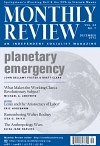Volume 64, Issue 07 (December)

As we write these notes at the beginning of November climate change is once again in the headlines in the United States and around the world. This is because of the devastating impact of Hurricane Sandy, not only on islands in the Caribbean, but also on the northeastern United States and particularly New York and New Jersey, with the impact of the storm dramatized by the damage to New York City. Coincidentally almost twenty-five years ago it was a heat wave experienced in New York, coinciding with climatologist James Hansen’s famous testimony to Congress, that first made global warming a public issue, and increasingly an international one with the formation that year of the United Nations Intergovernmental Panel on Climate Change. Whether Hurricane Sandy’s destruction in New York and New Jersey will lead to a similar elevation of climate change as a public issue this time around remains to be seen. | more…
Capitalism today is caught in a seemingly endless crisis, with economic stagnation and upheaval circling the globe. But while the world has been fixated on the economic problem, global environmental conditions have been rapidly worsening, confronting humanity with its ultimate crisis: one of long-term survival. The common source of both of these crises resides in the process of capital accumulation. Likewise the common solution is to be sought in a “revolutionary reconstitution of society at large,” going beyond the regime of capital.… It is still possible for humanity to avert what economist Robert Heilbroner once called “ecological Armageddon.” The means for the creation of a just and sustainable world currently exist, and are to be found lying hidden in the growing gap between what could be achieved with the resources already available to us, and what the prevailing social order allows us to accomplish. It is this latent potential for a quite different human metabolism with nature that offers the master-key to a workable ecological exit strategy. | more…
Eric Hobsbawm, who died last October 1, aged ninety-five, has been much celebrated as one of the twentieth century’s greatest English-language historians despite his steadfast advocacy of socialism and use of the tools of Marxian analysis. But, if asked, the founding editors of Monthly Review, Leo Huberman and Paul Sweezy, his lifelong colleagues and comrades, would have differed a bit. They would have said that it was precisely because Marxism was intrinsic to his theory, understanding, and action that he gained his preeminence.
Those who conclude that the working class is not a revolutionary subject because capitalism has changed the working class reveal that they do not understand the ABCs of Marxism. The working class makes itself a revolutionary subject through its struggles—it transforms itself. That was always the position of Marx—his concept of “revolutionary practice,” which is the simultaneous changing of circumstances and self-change. The working class changes itself through its struggles. It makes itself fit to create the new world. | more…
In February 1967 came the Arusha Declaration. The ruling party, the Tanganyika African National Union (TANU), issued the Arusha Declaration and a policy of socialism and self-reliance. Our word in Kiswahili, Ujamaa (translated as extended family or familyhood), became the official policy. A number of companies in the commanding heights of the national economy were nationalized by the government. That started a whole new debate at the university. Walter Rodney had just come from SOAS (the School of Oriental and African Studies, University of London) and became a young lecturer here. In the conference on rethinking the role of the university in now socialist Tanzania, he played a very important role. | more…
On his most recent album, Wrecking Ball, Bruce Springsteen crafted a powerful statement of support for the working class, the existence of which barely penetrates contemporary art or politics. This is not an accident: the growing power of capital over public discourse has provided it a forceful means through which to shape individual consciousness, and establish an apolitical and at most technocratic understanding of power.… Even in the cultural realm, the art and voices of the working class are sidelined and squelched. Working people thus become invisible. | more…
In 1929 Bronislaw Malinowski, the primogenitor of twentieth century anthropology, published an article extolling the merits of his science in the process of colonial administration.… It was essentially a fundraising pitch for the Institute, which was seeking a subsidy from the Rockefeller Foundation by demonstrating the workaday virtues of what was until then an obscure discipline with little apparent importance to the vast powers stretching outward from the heart of capitalism to envelope the world. Eight decades later anthropology’s quest for investment perseveres…. Yet the tables have strangely turned: it is now imperial powers, cash in hand, which turn to a reluctant anthropology, seeking scientific means of domination through a form of cultural warfare. In Weaponizing Anthropology, David Price documents the latest form of blood alimony proffered by the custodians of empire to the discipline which was once styled the “child of western imperialism.” | more…
